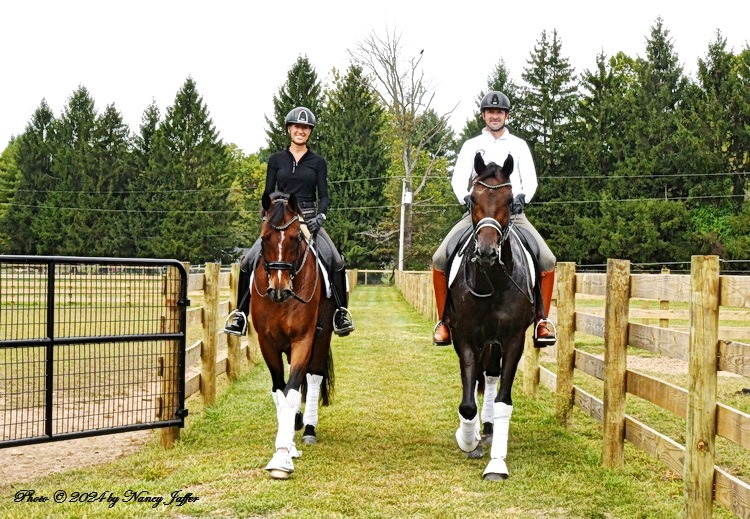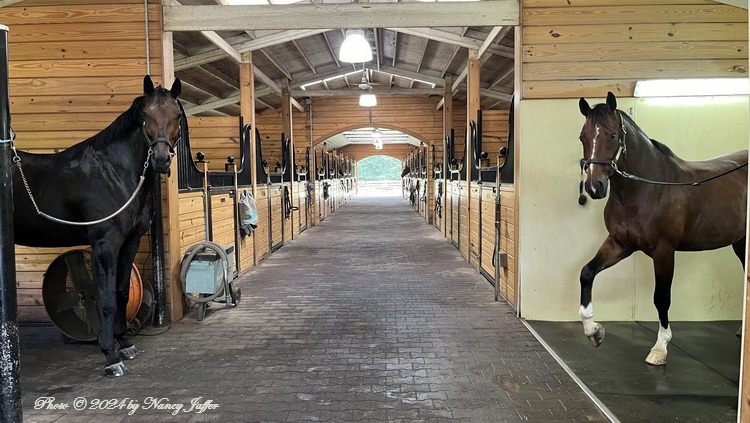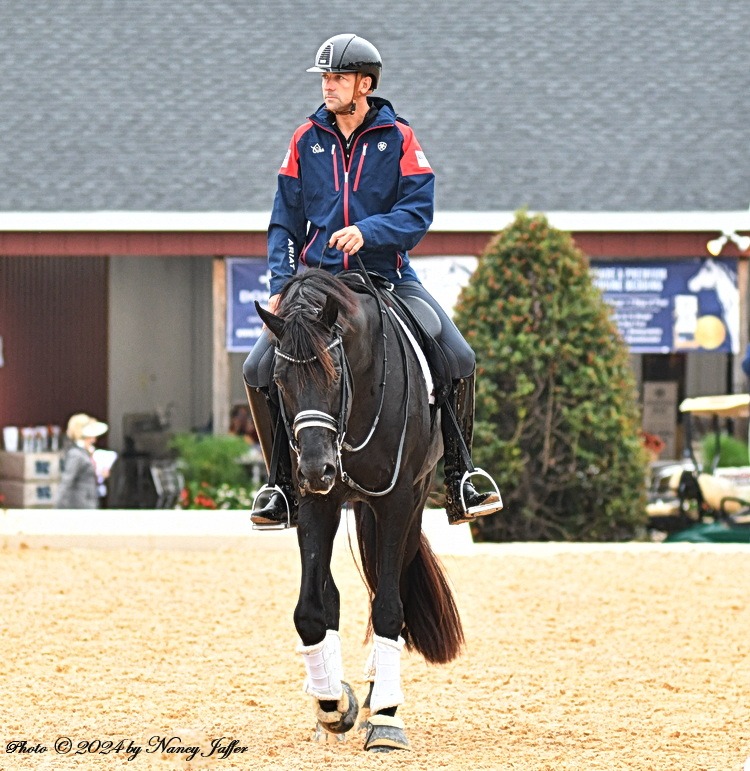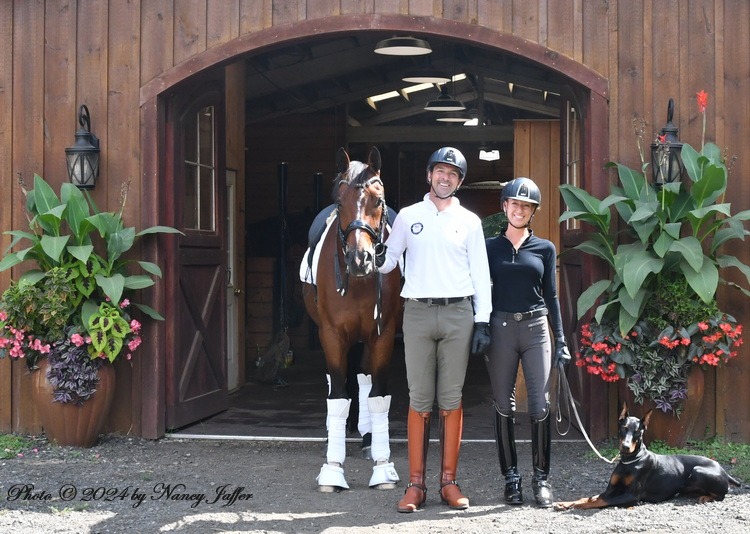They’re a hard-working power couple who rode away from Dressage at Devon with several blue ribbons last weekend.
But the story of Shannon Stevens and her husband, Olympic team member Marcus Orlob, is about more than victories. Behind each of the successful moments are years of struggle, hard work and disappointments, all building blocks for constructing success.
They work out of Elite Expression Dressage in Annandale, N.J., a former hunter/jumper establishment previously known as Fairwin Farm, when it was run by trainer Nanci Urban. Before that, it was an Arabian farm, and a horse owned by actor Patrick Swayze was one of the boarders.
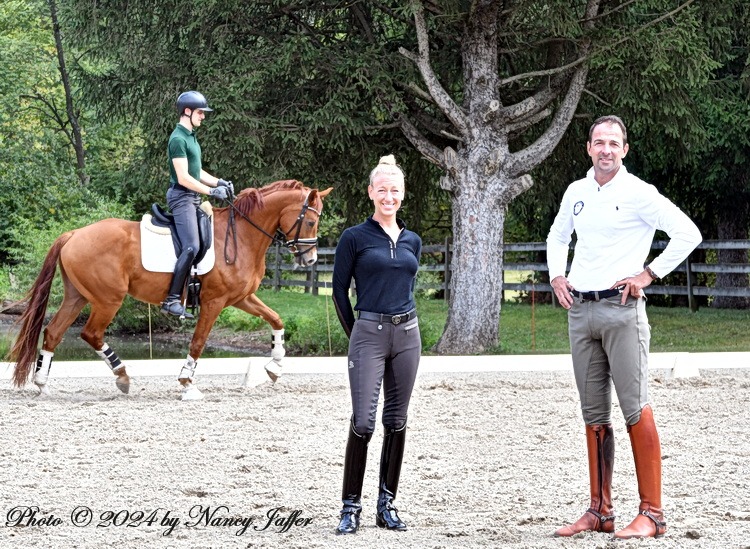
Shannon Stevens and Marcus Orlob in the outdoor ring as Amit Kovos rides one of the horses at Elite Expressions. (Photo © 2024 by Nancy Jaffer)
Adjacent to an area dominated by suburban housing, the wooded farm of nearly 60 acres is a contrast to the nearby development, with a long driveway that runs along pastures. Retired horses lounge happily together under the trees, there’s a lovely pond and the whole impression is of being out in the country, with the property backing up into the Amwell trail system.
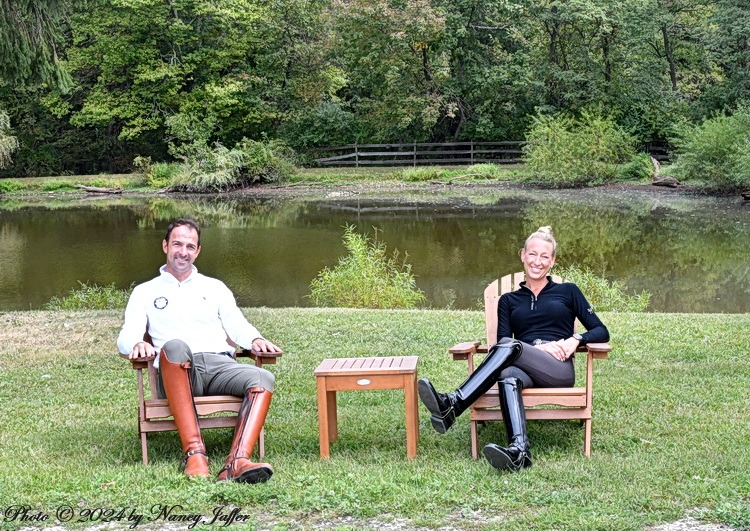
Marcus Orlob and Shannon Stevens like to take a break from training by the pond on their property. (Photo © 2024 by Nancy Jaffer)
When she was looking for a farm in 2013 and Fairwin came up, Shannon was told by the Realtor that she would hate the place, that there was a freight train which ran through the property several times a day, and the whole thing was dilapidated.
It takes a lot to discourage Shannon, so she wasn’t discouraged.
“I’ll never forget it,” said Shannon of her initial visit. “I pulled halfway down the driveway and didn’t even see the barn. I called Marcus and said, `I’ve found the facility.’ It sounds crazy, but this was the facility.”
The problem was that the couple needed to move 25 horses to the new barn within two weeks, because their previous stable had been leased to someone else. Although the owner of the Annandale farm deemed it impossible to comply with Shannon’s deadline for rehoming her horses, a relative of the woman said he would talk to Shannon about the sale. He warned, however, that he needed her to “convince me why I should somehow let this happen.”
Thriving on challenges is routine for Shannon, who trained in upstate New York with the late Carol Quinn and the legendary Centered Riding founder, Sally Swift. When her conversation about the property with the relative ended, it was determined that the owner not only would hold the mortgage so the couple could close the transaction, but Shannon and Marcus also were given money for renovations. Those include a complete re-do of the main barn, with gleaming pale wood and black cast iron accents along the rows of stalls.
You can understand why Marcus calls Shannon, “the Alpha Mare, the fighter.”
The couple has 30 or so horses at the farm, where they base during the spring, summer and part of the fall. For the winter, they are in business on 10 acres in Loxahatchee, Fla.
Both facilities have plenty of paddocks. Not every dressage trainer gives horses pasture time, but Shannon and Marcus are staunch believers in turnout and hacking in addition to the ring work because each of their animals “deserves to be a horse,” rather than spending most of their time in a stall.
“Everyone’s on their own program, they get whatever would make them super healthy and happy,” while being safe, said Marcus.
Marcus and Shannon met at Warendorf, the German riding school that is the home of Germany’s state stud. Marcus, already a well-trained rider, was there for two weeks simply to get his Bereiter certification. Shannon was the first American to be accepted at Warendorf, where she pursued a three-month Bereiter program.
When applying for admission, “I sent a riding video and my bio,” Shannon recalled, noting she got accepted contingent on coming to Germany within two weeks.
“I spoke no German,” said Shannon, who kept playing the Rosetta Stone language CDs in the little time she had to prepare.
“It was an incredible opportunity. They didn’t have a set program,” she reported, and her guess was that they didn’t know what to do with an American.
Like the other Bereiter candidates, she started the day cleaning stalls, then was assigned a horse to ride (often one of the naughtier stallions) and got instruction. Her ability was obvious. Hannes Müller, who ran the Warendorf program from 1994 to 2023, asked her, “Would you like to ride my horse after hours and warm it up for me?”
Of course she would.
Marcus’ family ran a funeral home in Dusseldorf, Germany, and it seemed likely he could take over eventually. But his father agreed that it would be good for Marcus first to go to the U.S., visit Shannon and see how things worked out.
Dressage became Marcus’ career, the couple got married in 2008 and the funeral home was sold.
Steffen Peters, who taught Marcus in a 2013 clinic, urged him to become a U.S. citizen, saying he foresaw being on a team with Marcus someday. That actually happened last summer, when both were on the U.S. squad at the Olympics in Versailles.
The fairytale dissolved in an unhappy ending, however, when Marcus was eliminated with his mount, Jane.
The Olympic riders had been given a diagram showing “how we should go in the arena and how we should go out,” said Marcus, explaining that the rider before him “didn’t follow the rules. We had to go out on the long side by the judge at E; (instead) he went out by H, where we should go in. Jane saw the horse leaving and she’s like, `Okay, I’m coming with you.’
“She made a U-turn and scratched herself.”
The mare was upset, but under Marcus’ guidance as they began their test, “Step by step, she started relaxing more,” recalled the rider, who was receiving marks as high as 7.6 for the half-pass.
“That was like, `Wow, I actually have a chance now of performing.”
Then an insignificant scratch on Jane’s white right hind fetlock caught the eye of the ground jury’s president, who rang the bell because of the blood rule.
Although Marcus got an apology, that didn’t make up for what happened. While comparing the scratch to “a mosquito bite,” he conceded, “it’s a tough call. I don’t blame them. The most important thing is the welfare of the horse.”
But he added, “When you can clearly see it was an accident, let the test finish.” Then a veterinarian can make a decision afterwards about whether the horse should be eliminated.
As he pointed out, everyone is on edge because of public scrutiny in the wake of horse abuse cases, and the fear that equestrian competition will be dropped from the Olympics. However, it would have been impossible for anyone in the stands to see a scratch that was so small (and, which, by the way, would not have been visible at all on a black leg).
In the aftermath, he observed, it was, understandably “one of the first times I was ever depressed for a few days.”
Marcus was hoping to finish riding the Grand Prix test at Dressage at Devon, but he and Jane’s owner, Alice Tarjan, were disappointed yet again when the mare wasn’t ready to compete after slipping as she exited the van on her arrival at the showgrounds. Although Marcus went on to win two classes with another of Alice’s horses, JJ Glory Day, the disappointment remained.
There was a bright moment for Shannon when she won her Prix St. Georges test with a personal best on Kathryn Williams’ All of Harmony, marked at 71.912. That was quite an achievement, since the Dutchbred horse hadn’t shown for two years and Shannon had only recently finished her recovery from a broken hip. She was sidelined as Marcus prepared for the Olympics, so they brought in Amit Kovos, a member of the Israeli dressage team based in England, in order to fill the gap before Shannon started her strenuous training routine again.
Still hoping to make his Olympic dream come true (Jane is only 10 years old), Marcus continues to work hard with lessons, training and clinics, as does Shannon, who also is training her own 4-year-old, King, by For Gribaldi.
“This is our own place, we don’t have big sponsors,” said Marcus, who would like to have more backing as he looks toward the 2026 world championships and the 2028 Olympics.
“I love the farm and want to bring it to what I dreamed of it to be,” said Shannon.
“But step by step, we can only do it when we sell horses.”
Marcus had one horse of his own, but sold it. While that “was painful,” he sighed, he’s practical.
“Now it’s time again to put some money into the property.”
He would like to have his own horse at some point.
“It’s nice to make your own decisions,” he said His relationship with Alice, however, is unique.
“She’s a true horsewoman, so she understands what it takes. There is zero pressure. You cannot pressure the rider or the horse.”
Marcus notes it’s hard to train horses for the big European competitions while in America, since there are so few experiences that can be compared with being in a European stadium, though Dressage at Devon is one.
But he likes the fact that horses at his New Jersey farm get accustomed to activity around them, which pays off when they get to an atmospheric show.
“When the trains come through and the geese are flying off the pond near the outdoor ring, clients are apprehensive,” Marcus observed.
They’re far more worried than the horses, who take it in stride.
He knows all the activity is good for getting the horses accustomed to different circumstances, and they don’t turn a hair over that or the wildlife, including deer and fox.
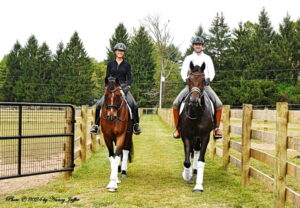
Shannon Stevens and Marcus Orlob take a ride between the paddocks on their farm. (Photo © 2024 by Nancy Jaffer)
As for the trains, “The horses graze next to the tracks and don’t even lift their heads,” he said with a smile.
He’d like to see more spectators and activities at the U.S. shows, so horses will not to be afraid when a loose dog is barking or running around. In Ermelo (Holland) “You see 10, 20 Jack Russells running between the stallions, and nobody cares. Everything in the U.S. is about liability, it doesn’t help us to be always careful and shy,” Marcus maintained.
Here’s his idea: In Ocala and TerraNova (Myakka City, Fla.), during a dressage show, “invite the town for free beer and hot dogs. Don’t just have horse people there. Maybe make it a farmers’ market.”
He suggests the organizer could offer everything from face painting for kids to free popcorn, just asking spectators in return to “sit in the stands for one hour and clap” as they watch the horses perform.
“Maybe you can attract more people into dressage.” But first, he points out “You need a reason to go there.”

